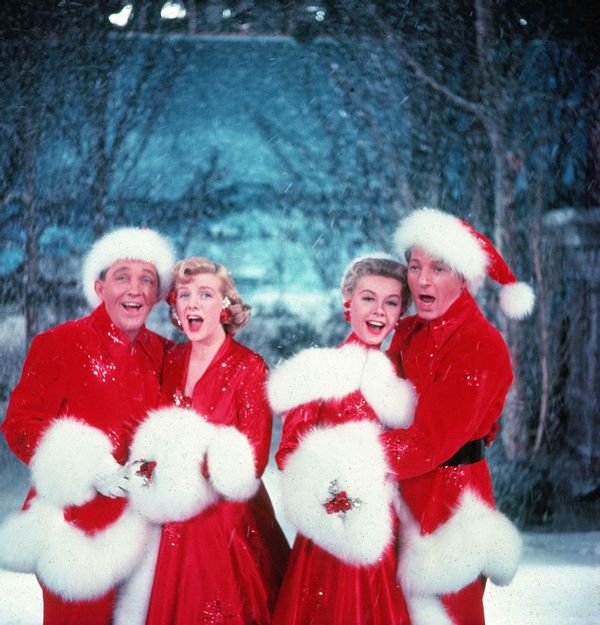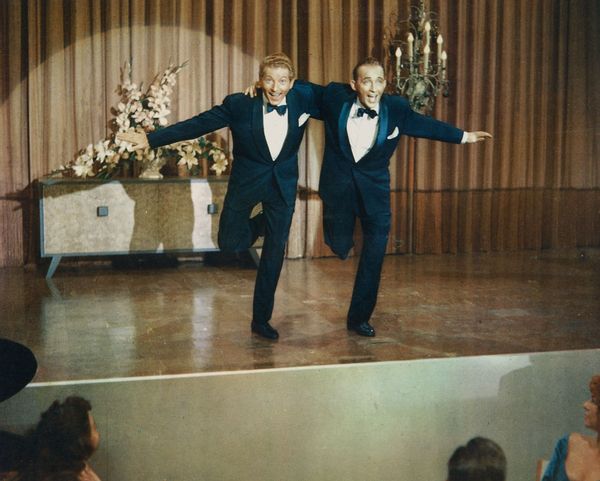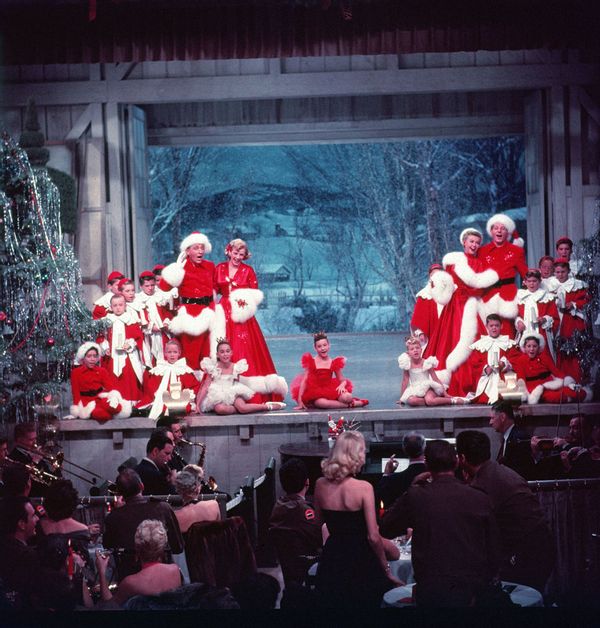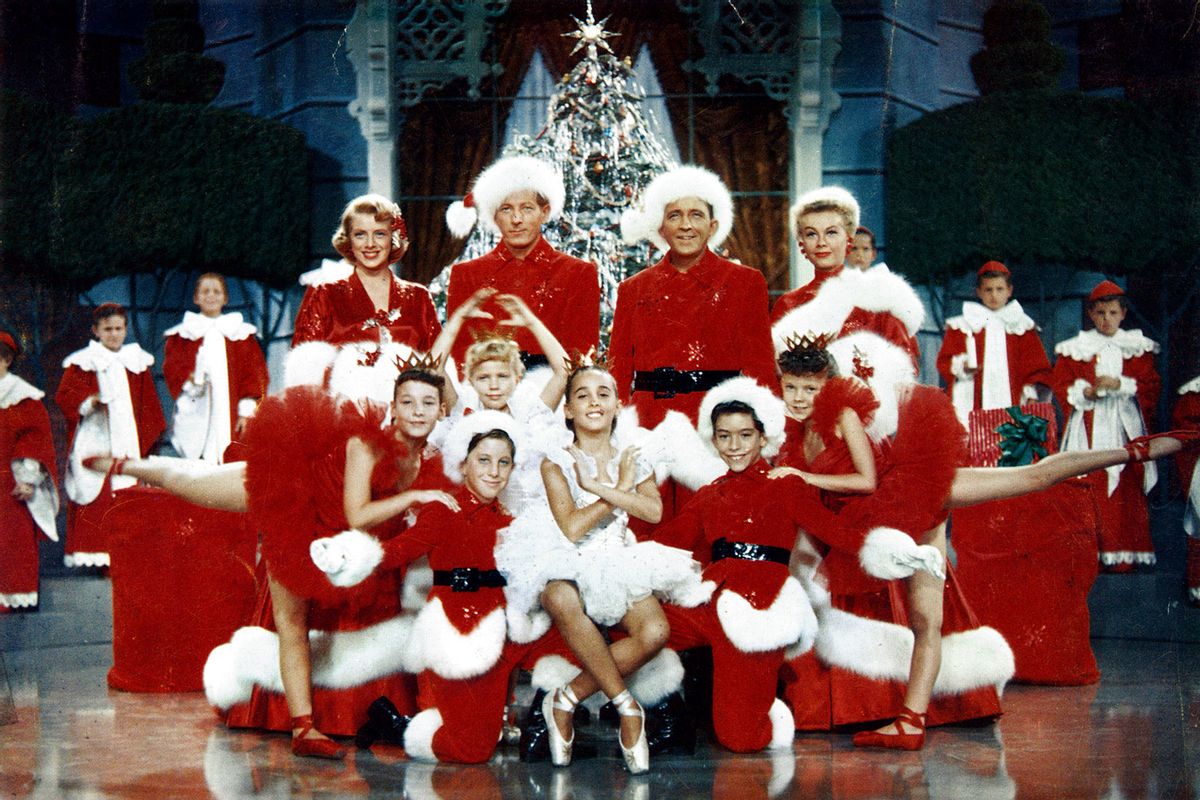My first takeaway from Martin Short's performance on "Saturday Night Live," which he hosted last weekend along with his "Only Murders in the Building" co-star Steve Martin, was obvious: This man did not grow up in my house.
Short appeared to miss some cues in the loose spoof of the (admittedly twisty) song "Snow" from the 1954 movie musical "White Christmas." Had he been a presence in my rural Ohio home, he would have had that song down pat. Every Christmas Eve for as long as I can remember, "White Christmas" has been one of the traditional evening movie choices for my family, along with "It's a Wonderful Life" and the relatively new addition, "Home Alone." But "White Christmas," the Bing Crosby, Danny Kaye, Rosemary Clooney and Vera-Ellen vehicle has war! Dancing! Sisters!
Most importantly: it has a show. Multiple shows, really, but the show that matters most is the one that will save everything. Specifically, the inn in Pine Tree, Vermont owned by General Waverly (Dean Jagger) the retired commander of the division Crosby and Kaye's characters served with in World War II. Post-service, Waverly sank his savings into the picturesque inn, and he's about to lose them. The inn is empty of tourists, because there's no snow in snowy Vermont.
Is "White Christmas" a prophetic metaphor for climate change? Maybe — but its prognostications also include our era of GoFundMe, the very American idea that our insurmountable problems, many caused by poverty and broken institutional systems, can and must only be fixed by individual fundraising. Let's put on a show, everybody!
In "White Christmas," solider show performers Bob Wallace (Crosby) and Phil Davis (Kaye) have made it big after the war, including launching a hit Broadway show "Playing Around." Fledging sister act Betty (Clooney) and Judy (Vera-Ellen) dupe the boys into coming with them to Pine Tree, where they've been hired to perform. Once Waverly, Bob and Phil are reunited, and they all learn the extent of the beloved General's financial problems, they know what will bring 'em back to Vermont. Not snow for skiing — but Broadway!
Bob and Phil invite some cast members up to the inn, along with bringing backstage crew members, huge scenery pieces and backdrops and everything else you need to mount an ambitious and thematically confusing production.
The show grows quite large (how are they feeding everyone?). Many musical numbers ensue, the most surreal of which is the basically performance art "Choreography." Phil and Judy fall quickly in love, but Bob and Betty are a tougher sell, being older and more responsible. The important thing is: musical theater brings everybody together eventually and the inn is saved. Also, it snows heavily at the end because if one thing can change the weather, it's a Christmas carol.
 American actors Bing Crosby, Rosemary Clooney, Vera-Ellen, and Danny Kaye sing together, while dressed in fur-trimmed red outfits and standing in front of a stage backrop, in a scene from the film 'White Christmas,' directed by Michael Curtiz, 1954. (John Swope/Getty Images)The idea of putting on a show to save the inn (or farm or school or town) is classic. In "The Blues Brothers," a show will save the orphanage. In "The Muppets Take Manhattan," a show will save an amnesia-suffering Kermit, or at least, remind him of himself. In "Rushmore," a show helps reconcile a couple (Bill Murray and Olivia Williams). More recently, in HBO's "The Sex Lives of College Girls," a (male strip) show saves the reputation of a disgraced fraternity while also weirdly raising thousands of dollars for climate change refugees.
American actors Bing Crosby, Rosemary Clooney, Vera-Ellen, and Danny Kaye sing together, while dressed in fur-trimmed red outfits and standing in front of a stage backrop, in a scene from the film 'White Christmas,' directed by Michael Curtiz, 1954. (John Swope/Getty Images)The idea of putting on a show to save the inn (or farm or school or town) is classic. In "The Blues Brothers," a show will save the orphanage. In "The Muppets Take Manhattan," a show will save an amnesia-suffering Kermit, or at least, remind him of himself. In "Rushmore," a show helps reconcile a couple (Bill Murray and Olivia Williams). More recently, in HBO's "The Sex Lives of College Girls," a (male strip) show saves the reputation of a disgraced fraternity while also weirdly raising thousands of dollars for climate change refugees.
Has a show ever saved anything? Maybe the von Trapp family at the end of "The Sound of Music," when they sneak away during their final musical number at the Salzburg Festival, escaping from Nazis to the Swiss border. But can a variety show, produced in a ramshackle barn, with plucky performers singing their hearts out, ever raise enough money for a mortgage, to stop a bank foreclosure, to keep the wolves from the door? How much do these tickets cost?
 Danny Kaye and Bing Crosby dancing on stage in a publicity still issued for the film, 'White Christmas', USA, 1954. (Silver Screen Collection/Getty Images)
Danny Kaye and Bing Crosby dancing on stage in a publicity still issued for the film, 'White Christmas', USA, 1954. (Silver Screen Collection/Getty Images)
The idea that we can do it ourselves, we must do it ourselves — it's a lonely, uniquely American one.
The Austrian von Trapps aside, it seems a remarkably American idea. You must pull yourself up by your bootstraps, alone and unaided — and maybe those boots are tap shoes. Still, you will sing for your supper, work for it – and it will work. With almost 40 million people living in poverty in America and about 69% of households unable to afford to buy a home, none of us can dance fast enough, sing loud enough, or be heard above the clamor.
And so the rise of crowdfunding, which first gained popularity in music circles, a way for artists to reach fans directly and receive support from their base. But at the start of the pandemic, crowdfunding took off for non-artists too. With so many people out of work, struggling to pay rent and buy groceries, where else to turn for help but to each other?
 On a stage full of children, American actors Bing Crosby, Rosemary Clooney, Vera-Ellen, and Danny Kaye perform on stage, dressed in red outfits with white fur trim, in a scene from the film 'White Christmas,' directed by Michael Curtiz, 1954. (John Swope/Getty Images)
On a stage full of children, American actors Bing Crosby, Rosemary Clooney, Vera-Ellen, and Danny Kaye perform on stage, dressed in red outfits with white fur trim, in a scene from the film 'White Christmas,' directed by Michael Curtiz, 1954. (John Swope/Getty Images)
Nothing brings a town together like a performance involving some of them.
The Washington Post reported on how one of the most popular crowdfunding sites, GoFundMe, saw a 150% increase in 2020 in money raised for campaigns. But that increase was short-lived, and the help didn't come for long. Or for everyone. In 2021, The Washington Post wrote, "A year into the pandemic, some individual crowdfunding campaigns are reporting little success raising donations to cover basic expenses."
Crowdfunding works for some, but it's a bandage on the gaping issues of outrageous medical bills and salaries that haven't kept pace with the cost of living. Long-term, it's about as sustainable as the idea that a show can keep an inn, an orphanage, a town afloat. The idea that we can do it ourselves, we must do it ourselves — it's a lonely, uniquely American one.
Want a daily wrap-up of all the news and commentary Salon has to offer? Subscribe to our morning newsletter, Crash Course.
But one of the saving graces of a show? It's a team effort. Even one-person shows require someone to direct, run the light board, paint the scenery. And nothing brings a town together like a performance involving some of them.
How many times did "Gilmore Girls" have a show, a tiny village with not one but multiple troubadours and Miss Patty's prolific dance studio? Stars Hollow once had a lavish "living paintings" performance while the equally small town of "Virgin River" inexplicably put on the most elaborate Renaissance Fair with every resident in opulent, Shakespeare in the Park-worthy gowns that they just had lying around somewhere next to their rain gear.
As a former community theater performer myself, I know each show, especially each show put on in a former church, with hand-sewn costumes, lights made from coffee cans, sets with the paint still drying on opening night — each show is a leap of hope. Each act in a play is actually an act of faith. That it will work at the last minute, the lines learned, the seats filled, and the urgent need saved at last. Guffman will come. The snow will come. The money will come. And the show must go on.

Shares